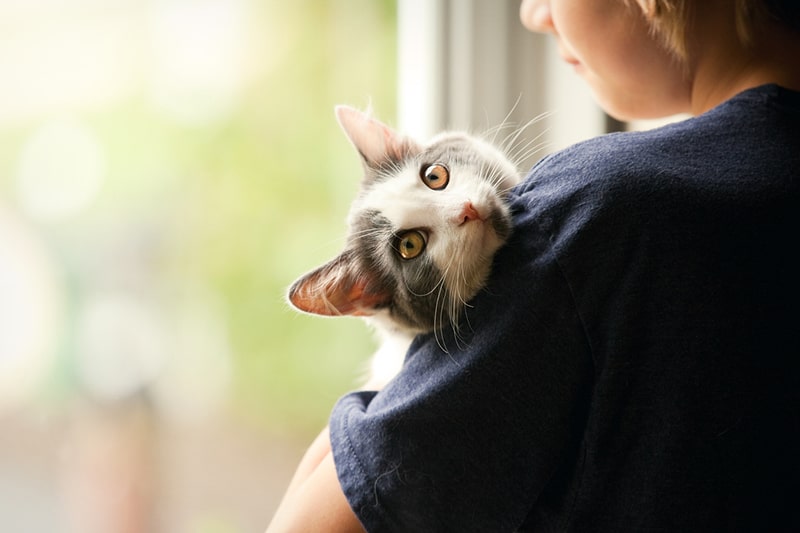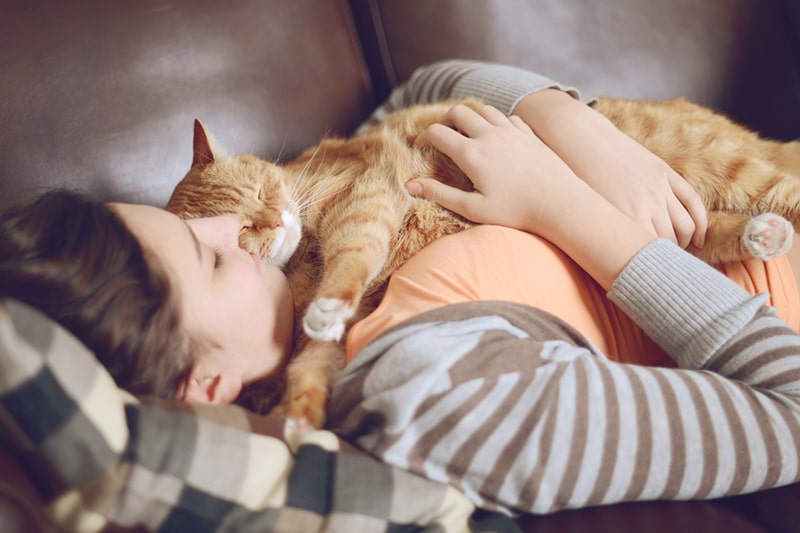
Cats bring lots of love and laughs into a household. They curl up in our laps, circle our legs to greet us, and dart around the room chasing ping pong balls. They also come with costs that are important to consider before bringing home a new kitty.
How Much Does It Cost to Get a Cat?
If you're adopting a cat from a shelter, the first cost you're going to encounter is the adoption fee. These fees can vary by shelter and the age of the cat you're adopting, but you can expect to pay somewhere around $50 to $175. Some shelter cats may already be spayed or neutered, microchipped, or vaccinated (at least for their first round), which helps reduce your initial expenses.
Getting a cat from a breeder is more expensive. Some breeders may charge around $750 or more for a cat. Our strategic partner The American Society for the Prevention of Cruelty to Animals® (ASPCA®) recommends adopting from a shelter. There are so many wonderful cats and kittens in need of loving homes. Plus, you could be saving a life by adding a shelter cat to your family.
Other One-Time Cat Costs
When you first get a cat, you'll need to invest in some essential items that range in price. There's also plenty of optional things you can purchase to help keep your cat happy and healthy.
Must-Haves
The ASPCA estimates that the capital costs for a cat are around $365 including initial medical care and spaying or neutering.* Of course, this number can vary quite a bit depending on the items you decide to purchase.
- Litter box – The price will depend on how fancy you want to go. Litter boxes run the gamut from affordable plastic trays to pricier automatic self-cleaning models. If your home has multiple floors, you may want to consider putting a litter box on each one.
- Carrier – You'll need a carrier to take your cat to the veterinarian and anywhere else they may need to go. Like litter boxes, there are plenty of options. You can choose an inexpensive model or go for a more deluxe version that costs more.
- Collar and ID tag – Even indoor cats should wear a collar and ID tag in case they get outside. This is true even if your cat is microchipped since the ID tag is the first thing someone will see if they come across your kitty.
- Scratching posts or mats – Cats have a natural desire to scratch. Sturdy posts and mats give them a good place to scratch that itch without damaging carpeting and furniture.
Your cat will also need food and water bowls, but you can use some you have around the house if you like. Remember to clean them regularly to prevent harmful bacteria from building up.
Optional Purchases
The items on this list can make your cat more comfortable in your home, but they are nice-to-haves. It’s up to you to decide if you’d like to invest in them.
- Pet bed – Your cat might be just fine curling up on a soft blanket or towel, but a pet bed can give them a cozy place to rest.
- Pet fountain – Some cats prefer to drink running water, in which case a pet fountain might be a good investment.
- Cat shelves – Cats love to sit up high and take in a full view of their surroundings. You can install sturdy cat shelves that let them climb up and take it all in.
- Window perch – A window perch can keep your cat busy watching what's going on outside from a safe spot.
- Pet tech gadgets – From computerized cat toys to two-way video, there's lots of tech available to help you care for your feline friend.

How Much Does a Cat Cost per Month?
According to the ASPCA, you can plan to spend around $634 annually on your cat. This breaks down to around $53 a month. Their list of annual expenses includes:
- Recurring medical expenses – Your cat will need routine veterinary care, like annual check-ups, vaccinations, and flea, tick, and heartworm medication.
- Cat food – You'll want to purchase a complete and balanced cat food that's right for your cat's age and lifestyle. Ask your veterinarian about healthy choices for your cat.
- Treats – Tasty treats can be helpful as you train your new cat. Keep in mind: they can be high in calories and unhealthy ingredients, so offer them in moderation.
- Safe toys – Toys provide cats with physical and mental stimulation, which can help avoid boredom and unwanted behaviors.
The ASPCA also adds in $30 for miscellaneous costs for other things, such as catnip or an extra scratching mat. Obviously, these costs can range widely depending on the brands you choose and your cat's individual needs.
In addition, you may have other expenses depending on your lifestyle. For instance, you may need to hire someone to come by and check on your cat if you work long hours. Or you may need to pay a cat sitter or boarding facility if you go away for a vacation. If you live in an apartment or condo, you could be charged an extra fee for having a cat to cover any potential damage.
Unexpected Costs
You may end up facing some unexpected costs, such as fixing household damage caused by your cat. Cats can rip up carpeting, scratch furniture, and cause other problems with those sharp nails. Some cats may also spray urine to mark their territory, which is a smell that can be tough to get out.
Additionally, cats can get hurt or sick, which can lead to expensive veterinary bills. Cats can miss a high jump and fracture a paw, swallow a bit of string they find on the floor and need surgery, or come down with an upper respiratory infection. It's impossible to predict how much an accident or illness might cost, but you can give yourself some financial cushion with a pet insurance plan.
How Much Does Cat Insurance Cost?
The cost of cat insurance depends on the coverage you choose along with other factors, such as the age and breed of your cat. When you're shopping for pet insurance, be sure to balance coverage and cost. An inexpensive plan may seem appealing, but it won't do you much good if it doesn't cover the care your cat might need.
If you decide to purchase cat insurance, you'll need to add that cost to your list of cat expenses. Keep in mind that it can be easier to budget for a monthly premium than manage a costly veterinary bill that comes out of the blue.

5 Ways to Save on Cat Costs
While the costs of a cat can add up, there are some creative ways to save money.
- Buy in bulk.
- Shop around.
- Make your own toys.
- Whip up your own cat treats.
- Consider pet insurance. Pet insurance can help you manage your cat's veterinary costs, so that you can give them the best care possible.
You can also save on cat care by doing your best to keep your cat safe and healthy. For instance, make sure they're drinking plenty of water, eating the right amount of healthy food, and getting enough exercise. Additionally, you should cat-proof your home to help prevent accidents. And of course, shower them with love and attention, which can help keep you both happy.
* ASPCA®
The information presented in this article is for educational and informational purposes only and does not constitute or substitute for the advice of your veterinarian.
(opens new window)
An ASPCA® Pet Health Insurance plan can help you with eligible costs for covered conditions like surgery expenses for accidents and help provide peace of mind that your pet can receive the care they need. Check out our online resources to learn more about your insurance options and get a free quote today. The information presented in this article is for educational and informational purposes only and does not constitute or substitute for the advice of your veterinarian.
Helpful resources for pet parents
Browse categories
-

All About Mixed Breed Dogs
Mixed breed dogs may look like purebred dogs, but you will be surprised to learn just how many breeds exist in your dog’s ancestry.
-

Tabby Cat Facts
Learn more about Tabby cats, including their various coat patterns, history, personality, and health.
-

Can Dogs Eat Chocolate
The short answer is a resounding NO, but we’re happy to elaborate on why not.

Browse Categories
(opens new window)
